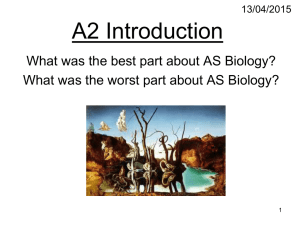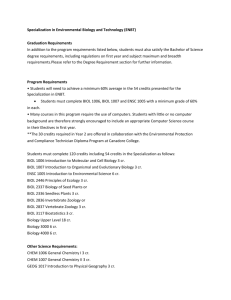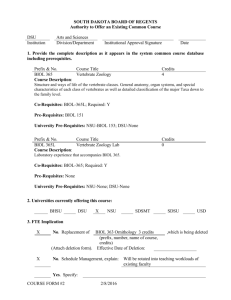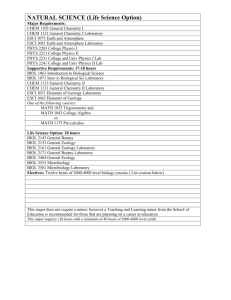biology course description
advertisement
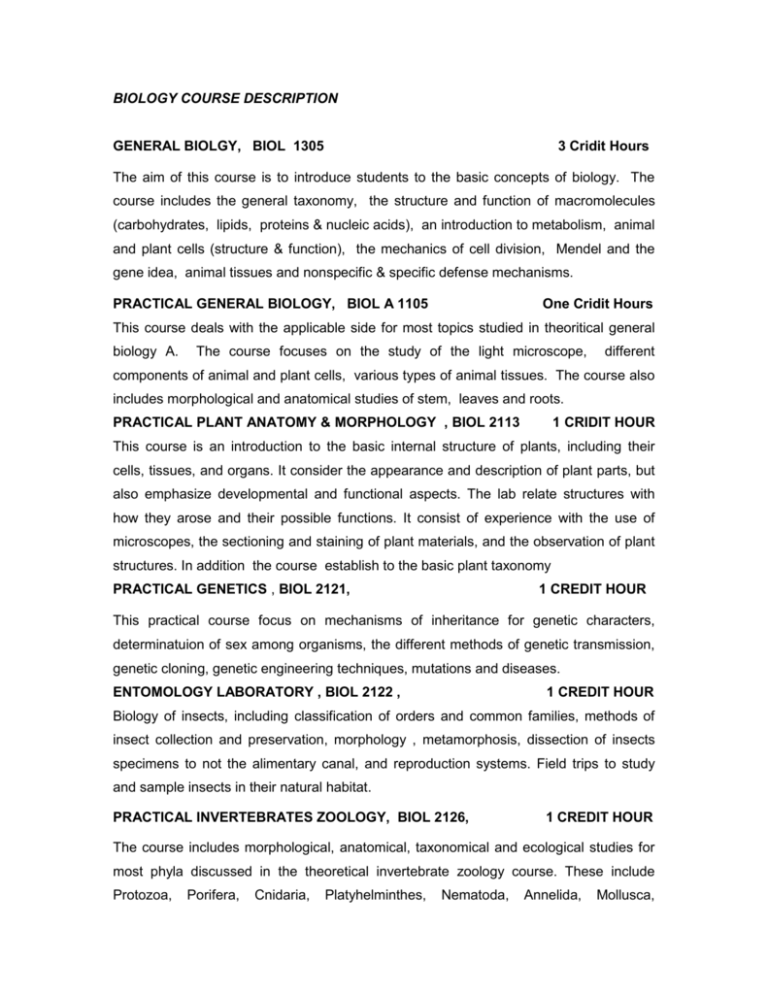
BIOLOGY COURSE DESCRIPTION GENERAL BIOLGY, BIOL 1305 3 Cridit Hours The aim of this course is to introduce students to the basic concepts of biology. The course includes the general taxonomy, the structure and function of macromolecules (carbohydrates, lipids, proteins & nucleic acids), an introduction to metabolism, animal and plant cells (structure & function), the mechanics of cell division, Mendel and the gene idea, animal tissues and nonspecific & specific defense mechanisms. PRACTICAL GENERAL BIOLOGY, BIOL A 1105 One Cridit Hours This course deals with the applicable side for most topics studied in theoritical general biology A. The course focuses on the study of the light microscope, different components of animal and plant cells, various types of animal tissues. The course also includes morphological and anatomical studies of stem, leaves and roots. PRACTICAL PLANT ANATOMY & MORPHOLOGY , BIOL 2113 1 CRIDIT HOUR This course is an introduction to the basic internal structure of plants, including their cells, tissues, and organs. It consider the appearance and description of plant parts, but also emphasize developmental and functional aspects. The lab relate structures with how they arose and their possible functions. It consist of experience with the use of microscopes, the sectioning and staining of plant materials, and the observation of plant structures. In addition the course establish to the basic plant taxonomy PRACTICAL GENETICS , BIOL 2121, 1 CREDIT HOUR This practical course focus on mechanisms of inheritance for genetic characters, determinatuion of sex among organisms, the different methods of genetic transmission, genetic cloning, genetic engineering techniques, mutations and diseases. ENTOMOLOGY LABORATORY , BIOL 2122 , 1 CREDIT HOUR Biology of insects, including classification of orders and common families, methods of insect collection and preservation, morphology , metamorphosis, dissection of insects specimens to not the alimentary canal, and reproduction systems. Field trips to study and sample insects in their natural habitat. PRACTICAL INVERTEBRATES ZOOLOGY, BIOL 2126, 1 CREDIT HOUR The course includes morphological, anatomical, taxonomical and ecological studies for most phyla discussed in the theoretical invertebrate zoology course. These include Protozoa, Porifera, Cnidaria, Platyhelminthes, Nematoda, Annelida, Mollusca, Arthropoda and Echinodermata. Field trips to investigate invertebrate fauna in their natural habitats are also carried out. PRACTICAL HISTOLOGY, BIOL 2160 1 CRIDIT HOUR It includes an introduction to the microscopic preparations used for histology and the cells (structure, types, shapes). the identification of the different types of the animal tissues; epithelial, connective, muscular and nervous and the histoloy of selected organs from the different animal systems, PLANT MORPHOLOGY & ANATOMY ،BIOL 2213 2 CRIDIT HOURS This course includes: a brief study on the ways of classification of different plants, a full study of morphology of different plant parts and a detail anatomical study of plant cell, roots, stems, leaves, flowers and fruits and finally the course explaine how to differentiate & compare between different groups of plants depending on their different morphological & anatomical characters. GENETICS, BIOL 2221 2 CREDIT HOURS This course is designed as introductory course for the different specialties in science, It covers the understanding of the different types of inheritance , mendelian, sex- linked quantitative and other types of inheritance. Different types of gene transfer mechanisms including transefection transfer and transformation will be studied as well as the principle of jumping genes . Sex determination systems will be studied. Gene cloning and other tools and recombinant DNA methods will be covered. The DNA structure and the main components of the central dogma of the genome as well as DNA repair systems will be studied. Type of gene mutations and chromosomal changes and its effect on the individuals health are covered. ENTOMOLOGY, BIOL 2222 2 CRIDIT HOURS This course provides the students with the basic knowledge on the insect boilogy. The course includes the following topics: the economical & medical importance of insects, collection & preservation of insects, comparative external morphology (head, thorax, abdomen and appendages), internal anatomy & physiology of different systems, metamorphosis and types of life cycles, relation between insects and humans, animals & plants. INVERTEBRATE ZOOLOGY BIOL 2326 3 CRIDIT HOURS The course discusses the biology of invertebrates in terms of morphology, internal anatomy and physiology in addition to their taxonomy, ecology, diversity, evolution and adaptations to their natural habitats. The course deals with the medical, economic and ecological importance of many invertebrate species as well. The course examines the following phyla: Protozoa, Porifera, Cnidaria, Platyhelminthes, Nematoda, Annelida, Mollusca, Arthropoda and Echinodermata. HISTOLOGY, BIOL 2260 2 CRIDIT HOURS It is divided into two parts: the principles of histology deales with an introduction to the histological techniques, the types of microscopes and stains then, the fundamental animal tissues (epithelial, connective, muscular and nervous tissues) concering their general aspects, types, sites and the function of each. The special histology deals with the histology of selected organs from the different animal systems with refering to the histological plan for each system. CELL BIOLOGY, BIOL 2311 3 CRIDIT HOURS The course deals with the following topics: prokaryotes versus eukaryotes, methods of studying cells, chemical components of cells, cell membrane; structure and function concerning micro- and macrotransfer, structure and function of cytoplasmic organells including endoplasmic reticulum, Golgi complex, lysosomes, vacuoles, cytoskeleton in addition to the role of mitochondria & chloroplasts in energy transduction, cell cycle and nuclear control of cell activities. Cell-to-cell signaling, gene regulation and DNA packing and organization. PRACTICAL PLANT PHYSILOGY , BIOL 3112 , 1CRIDIT HOURS This course is an overview of the base mechanisms underlying plant function, growth and development . general topics areas will include: plant structure and cell biology , plant – water relations and mineral nutrition long – distance transport phenomena, photosynthesis, respiration and plant metabolism, plant growth regulators, plant development and plant stress physiology. MARINE BIOLOGY LABORATORY, BIOL 3116, 1 CRIDIT HOUR The aim of this course is to provide students with the basic practical knowledge and hands-on experience regarding some of the most common experimental methods used in marine science and marine biology. These include the qualitative and quantitative characteristics of fish, the morphometric & meristics characteristics, the length-weight relationships, age determination, some important relationships in fisheries science such as the growth index, the coefficient of condition of fish, condition factor, fecundity, gonad-somatic index and liver-somatic index. Students will also learn about the profiling instruments. Field Trip to Gaza Shore through which student will learn the method of fish culture, they will also measure the speed of the longshore current, measuring water transparency and light intensity. Students will also perform experiments concerning the different methods for measuring the salinity in seawater, the nutrient limitation in coastal phytoplankton communities, the plankton diversity and taxonomy, the phytoplankton abundance, determination of oxygen concentration in seawater, and finally the acute fish toxicity test PRACTICAL VERTEBRATE ZOOLOGY, BIOL 3123 , 1 CREDIT HOUR The course includes morphological, anatomical, taxonomical and ecological studies for most vertebrate classes discussed in the theoretical vertebrate zoology course. These include Chordata, Cyclostomata, Chondrichthyes, Osteichthyes, Amphibia, Reptilia, Aves and Mammalia. Field trips to investigate vertebrate fauna in their natural habitats are also carried out. PRACTICAL ANIMAL PHYSIOLOGY, BIOL 3121 1 CRIDIT HOURS This course introduces the students to different physiological experiments concerning with blood components, Blood sampling and processing, measurement of erythrocyte sedimentation rate, hematocrit, blood coagulation, and bleeding, hemoglobin measurement, osmotic lysis, glucose determination in blood serum, enzymes of clinical significance, arterial blood pressure, physiology of muscles, Kymograph, physiology of skeletal muscle, properties of heart muscle, responses of intestinal smooth muscle. PRACTICAL MICROBIOLOGY, BIOL 3130 1 CRIDIT HOUR The course acquaints the students with the basic methods and techniques for dealing with and handling microorganisms in the laboratory, methods of sterilization & disinfection, staining techniques, preparation of culture media, isolation & cultivation of bacteria, control of microorganisms by physical & chemical agents, some biochemical tests for the identification of bacteria and detection of contamination in water & food. DIAGNOSTIC PARASITOLOGY BIOL 3131 1 CRIDIT HOUR This practical course aims to gaining the students with methods of stool collection and preservations. Identification of different diagnostic techniques like; wet mount, concentration methods (Sedimentation and flotation) ability to differentiate between the different stages of parasites (eggs, cysts, trophozites, larvae, adults). Staining methods for protozoa, egg counts, occult blood, some examples of medical insects causing diseases. PLANT PHYSIOLOGY, BIOL 3212 2 CRIDIT HOURS This course starts with a brief introduction to the structure of plant cell and some thyrmodynamic laws that explain most of the biochemical processes performed by plants. The course then deals with the following topics: water absorption & transpiration, salts absorption and the effect of their decrease & increase on plants, enzymes, proteins, carbohydrates & nucleic acids of plants, respiration & photosynthesis, plant hormones and finally the process of dormancy, its cause & its biological importance for plants MARINE SCIENCE, BIOL 3216 2 CRIDIT HOURS This course discusses the following topics: a brief introduction to marine biology including the history of this science, the oceanic environment, topography and structure of sea floor, the general chemical and physical properties of seawater, motion in ocean including surface circulations and currents, upwelling, tsunami, vertical and deep-water circulation, waves and tides, the biodiversity of the marine life such as planktons, nektons and benthic organisms, marine productivity, sea grass beds, kelp forests, coral reefs and finally the impact of human on the marine environment (pollution). EMBERYOLOGY, BIOL 3220 2 CRIDIT HOURS An introduction to the cellular divisions, potency, differentiation, development, growth and death and the tissue maintanance, mechanismes of fertilization and its cellular events forming zygote, cleavage and its types, morphogenetic movement and the shaping of the body plan including blastulation, gastrulation, neurulation and organogenesis in Amphioxus, Toad, Chick and Man with lightsopts on the cell divesification in the early animal embryo, cancer, cloning, transplatation and medical benifits. VERTEBRATES, BIOL 3223 , 2 CRIDIT HOURS The course discusses the biology of vertebrates in terms of morphology, internal anatomy and physiology in addition to their taxonomy, ecology, diversity, evolution and adaptations to their natural habitats. The course examines the following phyla: Chordata, Cyclostomata, Chondichthyes, Osteichthyes, Amphibia, Reptilia, Aves and Mammalia. PARASITOLOGY, BIOL 3231 3 CRIDIT HOURS This course deals with the following topics: definitions and concepts of parasitology, taxonomy of parasites, the relationship between parasite and host, study of different parasites e.g. Protozoa, Platyhelminths & Round Worms in terms of parasite structure & morphology, parasite life cycle, diseases caused by parasites and parasite diagnosis with emphasasing on the local parasites in Gaza, parasite control and finally study of the medical importance of some arthropods injuries to humans. ANIMAL PHYSIOLOGY, BIOL 3321 3 CRIDIT HOURS The aim of this course is to provide students with the basic physiological principles pertaining to the mammalian systems. Theses are blood and cardiovascular systems, the gastrointestinal system in term of digestion, absorption and the regulation of gastrointestinal function, the muscular system, the respiratory system and the process of gas exchange, the excretory system, maintenance of water and acid base balance, the central and peripheral nervous systems, special senses and the reproductive system. MICROBIOLOGY, BIOL 3330 3 CRIDIT HOURS This course is concerned with the nature and scope of microbiology, microorganisms especially bacteria, metabolism of bacteria, structure-function relationships, control of microorganisms, microbial genetics, study of growth & microbial diseases, classification of microorganisms and some applications of microorganisms. PRACTICAL MYCOLOGY ,BIOL 4133 , 1 CRIDIT HOURS Laboratory experimentation includes techniques for handling culture media preparation , identification ,and isolation of parasitic and non-parasitic fungi. PRACTICAL HISTOCHEMISTRY & MICROTECHNIQUES BIOLL 4134 1CREDIT HOUR it is an application for most topics studied in the theoratical part including: types of microscopic slide preparations for histological and histochemical studies, fixatives, decalcification, embedding sectioning and staining. PRACTICAL ECOLOGY, BIOL 4141, 1 CREDIT HOUR The course focuses on ecosystems analysis in terms of their biotic and abiotic components and energy flow, population ecology and dynamics in terms of estimating population sizes of both plant and animal communities using different models, and water analysis in terms of its physical, chemical and biological characteristics. Field ecology represents a significant part of the course which focuses on carrying out different ecotrips to different ecosystems and environmental institutions to study ecological phenomena, living organisms in their natural habitats and the threats facing the local ecosystems and natural resources. RESEARCH & SEMINAR, BIOL 4150 1 CRIDIT HOUR The aim of this course is to enable students to complete a research exercise which will include written and oral presentation of the findings. COMPARATIVE ANATOMY, BIOL 4224 2 CRIDIT HOURS The aim of this course is to provide an in depth introduction to relevant aspects of a comparative anatomical study of the following systems in various vertebrate classes: the integumentary system & its functional adaptations, digestive system & its derivatives, respiratory system, circulatory system, excretory system, genital system, nervous system and sense organs. COMPARATIVE PHYSIOLOGY, BIOL 4229 2 CRIDIT HOURS This course is designed to provide a sound base of comparative physiology to science students. The following topics are compared among the different classes of vertebrates & invertebrates: water & air respiration, oxygen and carbon dioxide transport in blood, blood coaggulation & hemostasis, circulation, food & fuel, excretion, muscle & movement, control & integration and reproduction. MYCOLOGY, BIOL 4233 2 CRIDIT HOURS This course includes the following topics: classification of fungi, morphological & anatomical study of different classes of fungi, life cycles of each class of these fungi and finally the phenomena of parasitism, symbiosis, decomposition & saprophyte and the importance of these processes in keeping of balance between nature & different organisms. HISTOCHEMISTRY & MICROTECHNIQUES, BIOL 4234, 2 CREDIT HOURS An introduction to the types of micrscopic preparations (smear, squach, tease, section and grinding), the principles of sampling, fixation, embedding, sectioning (paraffin , freeze dry and frozen sections) staining and decalcification of bone. It is also deals with the chemical contents of the cells includes carbohydrates, lipids, proteins enzymes,nucleic acids, minerals and pigments (structure, distribution and location in the cells, function and their response to any change in the normal state of the tissue) and the theoratical principles for the demonstration of each chemical item and the verification of the results by using controls). ECOLOGY, BIOL 4241 2 CRIDIT HOURS This course provides the students with special concepts regarding ecology and related topics. The course comprises biotic & abiotic components of ecosystems, food chain & energy flow within ecosystems, factors affecting the distribution of living organisms in their natural environments, population ecology, biotic communities & the types of biotic interrelationships and finally applied ecology regarding global & local environmental issues VIROLOGY, BIOL 4332 The course discusses the nature of viruses, 3 CRIDIT HOURS classification of animal viruses, viral nucleic acids, genetic variation of viruses growth-purification and characterization of animal viruses, detailed study of certain animal viruses e.g. (Herps, Hepatitis, Influenz, HIV & Rubella), viruses, antiviral chemotherapy-interferon-vaccines, bacteriophage, tumer collection of specimens for virological examination & immunodiagnosis of common viral diseases. BIOSTATISTICS, BIOL 4343 3 CRIDIT HOURS This course includes the following topics: introduction to biostatistics, organizing and displaying data, frequency distribution, graphing data, measures of central tendency, measures of dispersion, probability and probability distribution, sampling distribution of means, estimation of population means, test of significance, analysis of variance, Chisquare test, correlation & regression and finally vital statistics test. PRACTICAL BIOCHEMISTRY, BTEC 2161 1 CRIDIT HOUR This course introduces the students to different biochemical experiments concerning with general color tests for carbohydrates, reducing properties of sugars, tests on individual sugars, osazone formation, hydrolysis of starch and sucrose, solubility of lipids, emulsification, isolation of lecithin, acrolein formation, saponification, rancidity of oils, determination of acid value and peroxide value of oils, general color tests of proteins, precipitation of proteins, identification of an unknown amino acid and an unknown of carbohydrate, action of salivary amylase enzyme, invertase enzyme, aldehyde oxidase enzyme, isolation of cholesterol from brain tissue, identification of cholesterol, determination of cholesterol in blood serum. BIOCHEMISTRY, BTEC 2361 2 CRIDIT HOURS This course provides students with detailed study on the following topics: classification, structure and physical & chemical properties of carbohydrates, lipids and proteins, nucleotides & nucleic acids, enzymes and metabolism of carbohydrates, lipids & amino acids. ORGANIC CHEMISTRY, CHEM 2311 3 CRIDIT HOURS This course provides the students with the basic information of the physical & chemical properties - preperation – nomenclature- and reactions of alkanes, aldehydes, ketones alkenes, alkynes, aromatic compounds, alcohols, phenols, carboxylic acids, , esters and amines. The basic principles of stereochemistry will also be studiesd. PRACTICAL ORGANIC CHEMISTRY, CHEM 2111 1 CRIDIT HOUR This practical course introduces the students to the basic experiments dealing with the following topics: distillation, melting point, boiling point, separation of compounds by simple fractional distillation & steam distillation, chromatography, study of alcohols, phenols, aldehydes, preparation of some alkenes, alkyl halides & esters. methods of extraction, ketones & amines and



